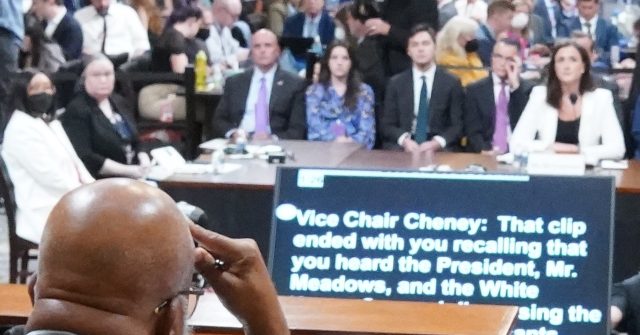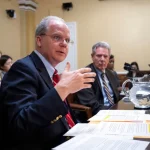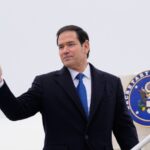

Cassidy Hutchinson, a former aide to President Donald Trump’s White House chief of staff, Mark Meadows, testified on Tuesday in the sixth public hearing of the January 6 Committee that she had heard third-hand accounts that Trump had tried to lead armed protesters in a march on Capitol Hill.
Specifically, Hutchinson testified that she heard deputy chief of staff Tony Ornato say that he heard Robert Engel, the U.S. Secret Service agent on Jan. 6, 2021, claim that Trump tried to seize the wheel of his car to force it to drive to the Capitol.
The testimony was not only hearsay — testifying about what a witness heard someone else say — but hearsay upon hearsay.
In ordinary trials, hearsay evidence is generally excluded in favor of testimony directly from the people who are alleged to have spoken. There are a variety of exceptions to the rule, but our legal system prizes direct testimony from eyewitnesses.
There are several reasons for that. One is that the Sixth Amendment guarantees the right to cross-examine witnesses. You cannot cross-examine hearsay evidence because the person alleged to have said something is not sitting in the courtroom.
The other reason is that hearsay evidence tends to be less accurate and less credible than direct testimony given under oath.
The committee found that out the hard way, when reports emerged after Hutchinson’s testimony that Ornato and Engel were prepared to testify to contradict her claims.
🚨 A source close to the Secret Service tells me both Bobby Engel, the lead agent, and the presidential limousine/SUV driver are prepared to testify under oath that neither man was assaulted and that Mr. Trump never lunged for the steering wheel.
— Peter Alexander (@PeterAlexander) June 28, 2022
Tony Ornato is denying that he told Cassidy Hutchinson Trump grabbed the steering wheel in presidential vehicle on 1/6 or lunged at a fellow agent, a USSS official tells @joshscampbell. CNN confirms that Ornato & Enger are prepared to testify that neither incident occurred.
— Gabby Orr (@GabbyOrr_) June 29, 2022
New: Source close to the Secret Service tells @PierreTABC to expect the Secret Service to push back against any allegation of an assault against an agent or President Trump reaching for the steering wheel.
— John Santucci (@Santucci) June 28, 2022
Presumably, Ornato and Engel had not yet been asked to testify about these claims. The committee thus preserved Hutchinson’s sensational claims without subjecting them to verification by the people alleged to have spoken.
The fact that the Secret Service itself, a leading law enforcement agency, is also willing to testify against Hutchinson’s claims is devastating to the credibility of her testimony, and suggests the committee was trying to manipulate the public.
In response, the committee claimed that it would welcome further testimony from witnesses to the events of January 6th:
A committee spox tells @CNN: “The Committee trusts the credibility of a witness who was willing to testify under oath & in public but is also willing to hear any information that others may have that would aid in their investigation.” https://t.co/WqxSCcysgf
— Gabby Orr (@GabbyOrr_) June 29, 2022
However, that invitation also lacks credibility, given that the committee has been caught manipulating testimony by other witnesses.
Hutchinson’s credibility was further undermined by the fact that the hearing was previously unscheduled, and was only announced on Monday, suggesting the committee was rushing to counter reports that it was failing to convince the public.
In previous attempts to target Trump through impeachment, Democrats responded to criticism of hearsay evidence by noting that impeachment was not a formal criminal proceeding in court.
But hearsay is not a mere formality. It protects the rights of the accused and the credibility of the evidence.
Hutchinson’s hearsay evidence further undermines the committee — as well as the media, who rushed to accept the veracity of her claims without verification, without cross-examination, and before the people she allegedly overheard had spoken.
Joel B. Pollak is Senior Editor-at-Large at Breitbart News and the host of Breitbart News Sunday on Sirius XM Patriot on Sunday evenings from 7 p.m. to 10 p.m. ET (4 p.m. to 7 p.m. PT). He is the author of the recent e-book, Neither Free nor Fair: The 2020 U.S. Presidential Election. His recent book, RED NOVEMBER, tells the story of the 2020 Democratic presidential primary from a conservative perspective. He is a winner of the 2018 Robert Novak Journalism Alumni Fellowship. Follow him on Twitter at @joelpollak.





